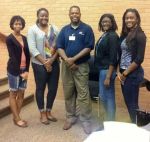
What Do You Do Before High School Graduation?
William Jackson, M.Ed.
Edward Waters College
@wmjackson #MyQuestToTeach
Dynamic scholarship information
at your finger tips.
https://twitter.com/prepforcollege
@prepforcollege (Twitter) #CollegeChat,
These suggestions are to help parents, grandparents
and guardians as graduation for their children
becomes a reality for high school seniors.
Graduation is a great accomplishment and
the end to an educational journey from Day Care
to High School. Before this momentous occasion
parents need to make sure all the i’s are dotted
and t’s crossed to make a smooth closure to a
continuing journey. These are just a few suggestions
from my experiences as a parent and teacher in
elementary education and higher education.

1. Make sure you obtain the most recent high
school “official” transcript(s) to mail to colleges
or potential employers. Many organizations and
schools require a transcript to see if
academically students are “qualified” to be
eligible. If an “official” one is not ready ask for
an “unofficial” transcript until the “official”
one can be sent.
2. Make sure you have current and up to date
medical and dental records. Even after graduating
from high school students are still dependent
on their parents for certain medical information.
Parents must understand “their” graduate is not
an adult yet, they are still maturing, learning
and growing. There is some information and
documentation only parents can obtain until
children are 21.
3. Make sure there are boundaries and expectations
on behaviors, actions, and even chores in the
home for the soon to be graduates. There should
be mutual understanding on everyone’s duties and
responsibilities and always respect. Stop telling
your child they are “grown” until they are out
of your house.
4. Talk to your child’s teacher(s) about consistent
communication so projects, homework and assignments
are kept current and get completed. Do not take the
words, “I got this,” as being responsible and accountable
by your child. Remember your personal urgency and
priority is not a priority for everyone else if you miss
deadlines and due dates.
5. Make any hair, nail or beauty appointments
months ahead to avoid the rush and chaos.
Have your monies available and get receipts
for all services and jobs.
6. Remind your child of the two institutions that
want their attendance:
Correctional (Prison) and Instructional (Higher
Education) and to make wise decisions.

7. Check your child’s academic (Cumulative) folder
for items that may delay graduation or entrance
into college, trade school or the military. You
have a right to see their records and ask questions
and if not provided seek an attorney for help as a
last resort.
Check for discipline referrals, changed grades,
teacher notes, etc. All documentation is important.
8. Make sure all deposits and fees are paid in
full before graduation. Check for lost books, needed
forms and other items that should be completed.
Do not trust your child unless they show they
are responsible and then consider the source!!!
9. Know what your child’s GPA is, weighted or
unweighted and if they have all their credits.
10. Make sure your child takes the SAT and the ACT
several times. Many schools only require one, but
better safe than sorry. If your child is attending
and HBCU check about further tests they will
have to take the week before school starts.
11. Check on Bright Futures scholarship information.
This can contribute to monies for school
12. Many HBCU’s accept ACT scores and SAT. Use whichever
gives you a better chance of getting into college
and this may affect monies.

13. Work on your child’s Marketable skills to
help them network and build their Brand.
14. Set Academic, Professional, Monetary and Career
goals now so your child will have a flexible plan.
15. Have your child volunteer consistently, stay
involved in your community, and church. Volunteer
hours can still help with networking and build
marketable skills to use later.
16. Search online and inquire with local
businesses about summer internships paid and
unpaid. Your time is valuable so unpaid is
important also.
17. Join local business organizations like
Chamber of Commerce to gain
marketable skills and get a jump on career goals.
18. Participate in church events and activities
helps build your resume or CV curriculum vitae.
19. Take college tours over the summer, visiting
schools to make sure you are familiar
with college or even the military.

20. Social Media entries; post positive content,
pictures, text and video. Your
e-Reputation and e-Personalities tell a story
about you. Social Media content will define you
and may be your first representation of you
to others.
21. Register with LinkedIn to start networking
and connecting. There is an NEW LinkedIn for
students. https://students.linkedin.com/
22. Continue to research educational options
and inquire even now about Masters and
Doctorial programs.
23. Make sure you and your child understand
what type of diploma they will have. It is
painful to expect a High School Diploma and
receive a Certificate of Attendance,
an ESE Diploma or others.
24. On Social Media unfriend and even block
those that are openly using drugs, weapons
and involved in criminal actions.
You may be “guilty by association” with them.
25. Have a “real” Social Security card, and
Birth Certificate, and if necessary a
Visa to travel abroad.
26. Check with your local police department
to make sure there are no records of
mistaken criminal activity from someone
impersonating you or looks like you.
27. Financial Aid and Scholarship
Information can be found online.
https://twitter.com/prepforcollege
@prepforcollege (Twitter) #CollegeChat,
27. Google and Hashtag yourself to
“see” what is online about yourself to be
prepared for questions.
Be careful with unprotected sex, illegal
drugs and last minute booty calls,
drug binges and other stuff that can
cost you a scholarship or your life.
There are too many young people that
almost “made it” and have died or
been arrested by bad decisions at the
last minute.


























































































































